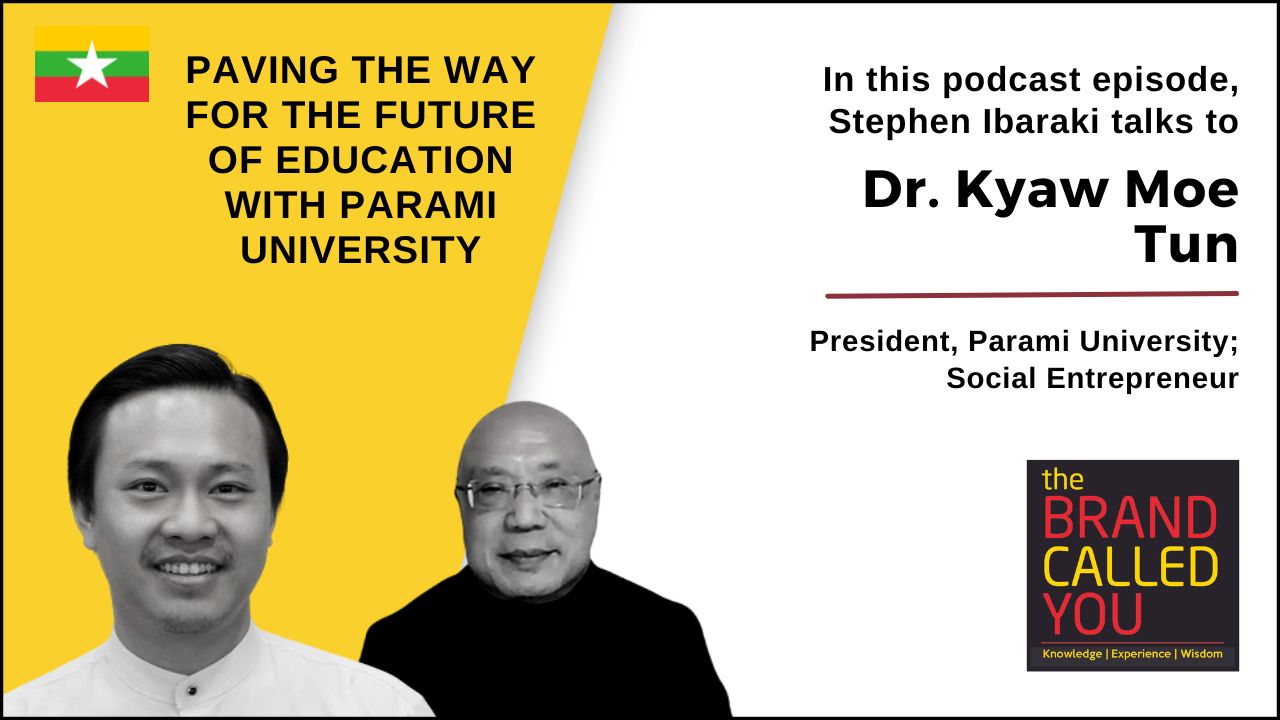Dr. Kyaw Moe Tun | President, Parami University; Social Entrepreneur
- Dr. Kyaw Moe Tun is the President of Parami University in Myanmar.
- He also undertakes teaching science courses at the University.
Podcast
Overview
In the ever-evolving landscape of education, Dr. Kyaw Moe Tun stands as a visionary force, pioneering a transformative approach to learning. As the founder of Parami University, he is on a mission to empower minds and reshape the future of education in Southeast Asia. Join us as we uncover the strategies, challenges, and aspirations that drive the creation of a regional hub for education, where boundaries are transcended, and minds are truly empowered.
[00:15] – About Dr. Kyaw Moe Tun
- Dr. Kyaw Moe Tun is the President of Parami University in Myanmar.
- He also undertakes teaching science courses at the University.
- He completed his undergraduate education at Bard College at Simon’s Rock (USA) and Oxford University (UK) and received his Ph.D. in Chemistry at Yale University (USA).
[20:43] – What is the vision for Parami University in the future?
- The vision for Parami University includes establishing a residential nonprofit liberal arts and sciences university in Burma.
- I hope for a return to Burma for a physical campus once the situation stabilises.
- The goal is to continue partnerships with Bard College and maintain dual degree programs while working towards regional accreditation in the US.
[32:57] – What challenges and advantages do online learning present for assessment and testing?
- There are several available proctoring tools.
- We have AI tools that can detect movement, lock screens during quizzes, and prevent unauthorised searches.
- We motivate the students to learn genuinely, reducing the incentive to cheat.
[38:25] – How do you envision the future of education in 2035?
- I feel that education will focus on cross-boundary knowledge and skills, including critical thinking, interpersonal skills, and communication skills.
- Students need to be flexible and adaptable in the face of technological advancements.
- While AI tools will play supporting roles, I believe that human educators will continue to be essential, providing a valuable human touch that AI cannot fully replace.
[43:39] – What are your recommendations to the audience?
- We need to engage with educational institutions to shape the next generation of thinkers and doers.
- It is important to understand the challenges faced by today’s youth, given the rapid advancements in technology.
- There is a need for collaboration between industry leaders and traditional universities to prepare for the future.
RESOURCES:
Learn more about Dr. Kyaw Moe Tun: LinkedIn
Enjoyed this podcast?
If you learned new insights about building a regional education hub and online education, subscribe and share them with friends!
Love to give us 5 stars? ⭐⭐⭐⭐⭐ If you do, we’d love a review from you. Help us reach more people to keep them in the know as we talk to leaders, high achievers, and thought leaders from diverse backgrounds and nationalities. Excellence can come from anywhere; stay in the know, and hear from emergent high achievers and gurus.
Stay updated with what’s shaping the world today through the latest The Brand Called You Podcast episode. Follow us on iTunes, Spotify, and Anchor.fm.
You can find us at:
Website: www.tbcy.in
Instagram: http://bit.ly/3HO7N06
Facebook:http://bit.ly/3YzJOaD
Twitter: http://bit.ly/3wMBOXK
LinkedIn: https://www.linkedin.com/company/tbcy/
YouTube: http://bit.ly/3jmBqfq
Chingari: https://chingari.io/tbcypodcast
Josh: http://bit.ly/3WWP0nB
Thanks for listening!
Profile
- Dr. Kyaw Moe Tun is the President of Parami University in Myanmar.
- He also undertakes teaching science courses at the University.
- He completed his undergraduate education at Bard College at Simon’s Rock (USA) and Oxford University (UK) and received his Ph.D. in Chemistry at Yale University (USA).


